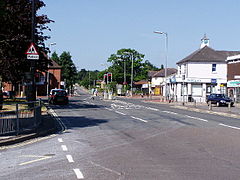Hedge End
| Hedge End | |
|---|---|
 The town centre |
|
| Hedge End shown within Hampshire | |
| Population | 20,790 (2011 Census) |
| OS grid reference | SU490128 |
| Civil parish |
|
| District | |
| Shire county | |
| Region | |
| Country | England |
| Sovereign state | United Kingdom |
| Post town | SOUTHAMPTON |
| Postcode district | SO30 |
| Dialling code | 01489 |
| Police | Hampshire |
| Fire | Hampshire |
| Ambulance | South Central |
| EU Parliament | South East England |
| UK Parliament | |
| Website | Hedge End Town Council |
Hedge End is a town and civil parish in Hampshire, England. Situated to the east of the City of Southampton, it adjoins the districts of West End and Botley. Hedge End lies within the Borough of Eastleigh and is part of the Southampton Urban Area. The original hamlet developed on Botley Common after 1250 when it was granted to the men of Botley as common pasture. In 1267, royal charters allowed Botley to hold an annual fair and a weekly market on the common which eventually became a market town.
The Belgae tribe inhabited the Hedge End area prior to the Roman conquest. A Roman road from Clausentum (a fortified harbour in what is now Bitterne, Southampton) passed through the area on route to Portus Adurni (Portchester Castle) and Noviomagus Reginorum (Chichester). The crossing of the River Itchen at Mansbridge and the crossing of the River Hamble at Botley date to AD932. The road that linked those two river crossings would have followed the approximate route of the modern Grange Road. From Mansbridge, it is 4 miles (6.4 km) to the port of Southampton and 12 miles (19 km) to Winchester, which was for a period the capital of England. Kings of England owned hunting land at King's Copse (originally known as King's Forest).
Farming at the Manor of Shamblehurst is mentioned in a record dating to 1219. Although this area is within the boundary of modern Hedge End, the original hamlet of Hedge End first established itself on Botley Common. This land was granted to the men of Botley as common pasture in 1250. That area is towards the bottom of the hill that rises up to Netley Common and is rich with natural streams and springs. Prior to the Erection of Cottages Act 1588, an Englishman could build his house on common land if he could raise the roof over his head and have a fire in the hearth between sunrise and sunset and claim the dwelling as his home. That procedure and the presence of a reliable water supply would have allowed a few dwellings to become established on Botley Common from 1250 onwards.
...
Wikipedia

